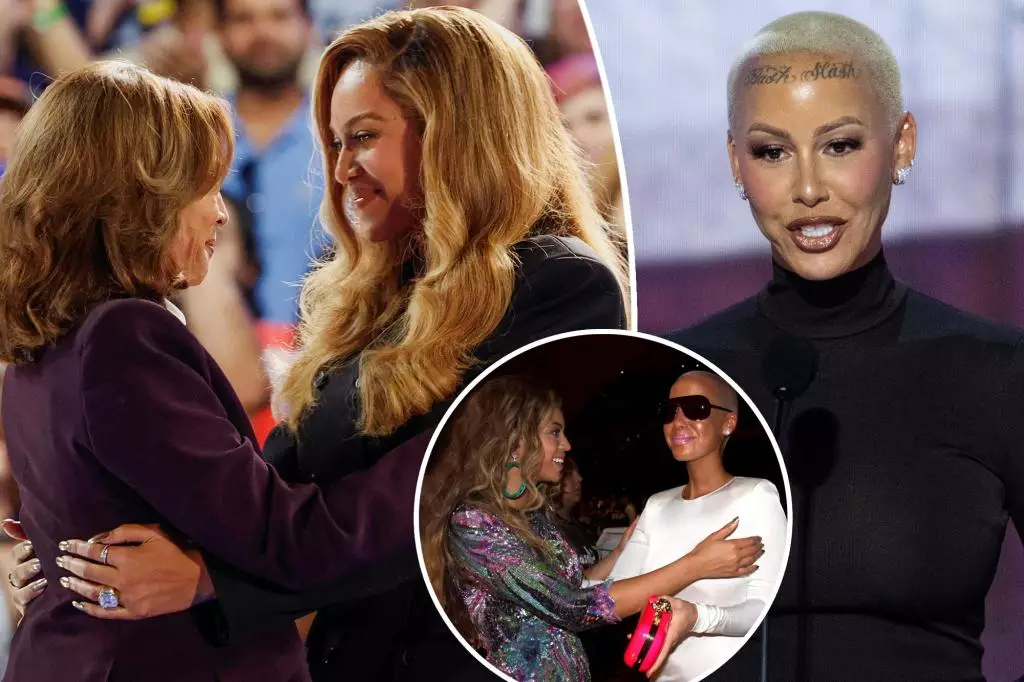In the world of celebrity culture, conversations can ignite into wildfires with the flicker of a comment. One such case is the recent fallout involving Amber Rose and Beyoncé, which has been making headlines for all the wrong reasons. This situation not only highlights the fragile relationship between public figures and the media but also provokes questions about the nature of celebrity statements and the responsibilities that come with them.
The Incident: When Comments Go Viral
Amber Rose stirred the pot when she claimed that Beyoncé had “taken” her speech during a campaign rally for Vice President Kamala Harris. In her remarks, Rose suggested that Beyoncé was imitating her words from a previous event where she had spoken about motherhood and the significance of voting. This cheeky assertion quickly drew attention and backlash from fans and critics alike, who took to social media to voice their disbelief and disdain.
As news outlets caught wind of Rose’s comment, what started as a lighthearted jab morphed into an international discussion, underscoring how quickly public perceptions can shift. Rose’s explanation of her intentions—that she was simply “trolling” and joking with friends—came too late to quell the outrage. This blundersome foray into such a serious subject clearly backfired, showcasing the thin line between humor, provocation, and criticism in the realm of celebrity.
Beyoncé, a figure of immense cultural influence, took to the stage with gravity at the Houston rally, articulating her thoughts about the challenges facing modern society. Her remarks transcended the typical campaign rhetoric, as she spoke passionately about motherhood, freedom, and the necessity of civic engagement. In juxtaposition to Rose’s almost whimsical comments, Beyoncé’s message resonated deeply with supporters, affirming her status not only as an entertainer but as a voice for change and empowerment.
The contrast between the sincerity of Beyoncé’s stance on political issues and Rose’s flippant remark reveals the different roles celebrities play. While artists like Beyoncé leverage their platforms for advocacy, other public figures may grasp for attention through provocative statements. This distinction seems to have escaped Rose in her analysis of the situation, leading to her unwittingly positioning herself in a much less favorable light.
Public Reaction: Social Media Outcry
Social media, the double-edged sword of the digital age, amplified the responses from the masses. Users criticized Rose not just for her comments, but for the perceived delusions of grandeur embedded within them. Commenters pointed out the stark contrast in their respective personas—one as an industry titan and the other as a somewhat polarizing reality star. Observations like “Beyoncé is a mother. Amber is a baby mama” aptly summarize the difference in public perception, suggesting that Rose’s attempts to align herself with Beyoncé lacked legitimacy.
Such responses highlight an important reality in celebrity culture: the audience wields significant power. They determine who holds credibility and who does not. Rose’s blunder serves as a reminder that celebrities are often scrutinized—perhaps excessively so—when they attempt to position themselves in the same conversation as icons, especially when they lack the same influence or integrity associated with these figures.
As the dust settles from this latest debacle, there are lessons to be gleaned regarding accountability and the dangers of seeking validation in the world of celebrity. While Rose may have intended to deliver a tongue-in-cheek comment, the consequences of her words extend beyond her own reputation. They illuminate a broader truth about public figures: their voices carry weight, and their remarks can shape narratives in significant ways.
The incident underscores the immense challenges celebrities face in maintaining their image amid a cacophony of opinions and expectations. It is a delicate balancing act that requires not just charisma but also a sense of responsibility. As for Rose, her desire to provoke may have inadvertently highlighted her misunderstandings of the context in which she speaks, eventually leaving her the subject of ridicule rather than respect.
The intersection of celebrity comments and public perception is a volatile space where humor and hubris often collide, reminding us that not all that glitters is gold in the realm of fame.

